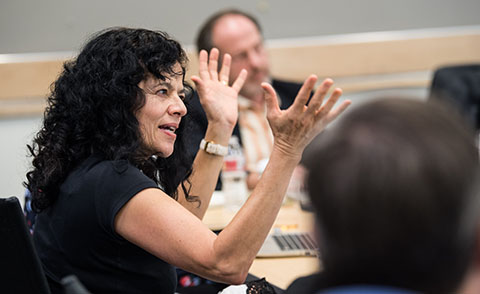Behavioral Science and the Human Dimensions of Energy Systems
NREL's behavioral science research takes a comprehensive, people-centered approach to examining community and place-based patterns, with a focus on interactions among populations, energy systems, the built environment, and mobility options.
Behavioral and social scientists collaborate with researchers across the lab and around the globe to generate knowledge for energy solutions that will be supported by the world beyond the laboratory. This translates into success for a wide range of research, development, and deployment projects.
Crosscutting R&D Capabilities

A former NREL researcher discusses strategy and priorities at the Community Round Table event. Photo by Dennis Schroeder, NREL
NREL's behavioral and social scientists deliver qualitative and quantitative insights, applying their expertise in areas such as decision-making science, sociology, anthropology, urban planning, and cognitive science. Their capabilities map decision-making variables to energy strategies through:
- Identification of factors affecting access, motivation, and responses to change
- Assessment of deployment and technology adoption barriers and opportunities
- Place-specific mapping
- Engagement via focus groups, interviews, and surveys
- Embedded sociodemographic analysis and systematic observation
- Exploration of trends and patterns based on quantitative metrics and indicators
- Analysis of qualitative empirical data to explain trends and patterns.
Understanding People Unlocks R&D Success
NREL's innovative behavioral research pairs data and field observations of social patterns to better understand how people will respond to new energy options. Identifying a population's priorities related to cultural, social, environmental, economic, geographic, and political issues makes it possible to develop and deliver integrated energy solutions that will meet the varying needs of communities nationwide.
Behavioral research amplifies the effectiveness of NREL's breakthroughs in all areas, from bench research on photovoltaics, to systems feeding renewable energy to the electrical grid, to batteries capable of storing that energy, autonomous electric cars that run on that power, and more. Understanding human behavior makes it more likely that a new technology or idea developed in the lab will succeed in the real world, improving people's quality of life and the health of the planet.
Browse Publications
NREL-published journal articles, conference papers, and reports about behavioral science.
Partner With Us
The behavioral and social science team at NREL partners with other research institutions, government agencies, and industry to tackle some of the world’s most difficult energy challenges while pursuing a better quality of life for all. Learn how to work with us.
Contact
Director, Accelerated Deployment and Decision Support Center
Share
Last Updated April 9, 2025
